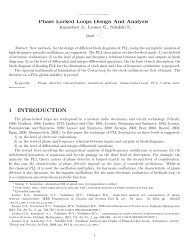Technical Sessions – Monday July 11
Technical Sessions – Monday July 11
Technical Sessions – Monday July 11
Create successful ePaper yourself
Turn your PDF publications into a flip-book with our unique Google optimized e-Paper software.
� HA-20<br />
Thursday, 9:00-10:30<br />
Meeting Room 217<br />
Managing Knowledge and Innovation<br />
Stream: Knowledge and Knowledge Organizations<br />
Invited session<br />
Chair: Uttarayan Bagchi, Information, Risk and Operations<br />
Management, University of Texas, 78712, Austin, TX, United States,<br />
Uttarayan.Bagchi@mccombs.utexas.edu<br />
Chair: A. D. Amar, Management Department, Seton Hall University,<br />
School of Business, 400 South Orange Ave., 07079, South Orange,<br />
NJ, United States, amaramar@shu.edu<br />
1 - Rating Customers According to their Promptness to<br />
Adopt New Products<br />
Erick Moreno-Centeno, Industrial & Systems Engineering, Texas<br />
A&M University, 3131 Tamu, 77843, College Station, TX,<br />
United States, e.moreno@tamu.edu, Dorit Hochbaum, Phillip<br />
Yelland, Rodolfo Catena<br />
We use the separation-deviation model (SD-model) to processes commercial<br />
data of Sun Microsystems in order to rate Sun’s customers according to their<br />
promptness for adopting new products. We provide a novel interpretation of<br />
the SD-model as an unidimensional scaling technique and show that it outperforms<br />
several dimension-reduction and scaling techniques. We analyze the<br />
results with respect to various dimensions of the customer base and report on<br />
the generated insights.<br />
2 - Knowledge Leadership: Why, What and How?<br />
Uttarayan Bagchi, Information, Risk and Operations<br />
Management, University of Texas, 78712, Austin, TX, United<br />
States, Uttarayan.Bagchi@mccombs.utexas.edu<br />
It has been said that when it comes to successful exploitation of knowledge, it<br />
is leadership rather than management that is more to the point. In this talk, we<br />
start by trying to establish the why of knowledge leadership. We discuss both<br />
the distinctive characteristics of knowledge as an organizational resource and<br />
the characteristics that distinguish leadership from management, to argue that<br />
knowledge and leadership are truly compatible and commensurable constructs.<br />
We then proceed to articulate the what and the how of knowledge leadership.<br />
3 - Super-Flexibility for Real-Time Adaptation: Insights<br />
from Silicon Valley<br />
Stuart Evans, Silicon Valley Campus, Carnegie Mellon<br />
University, CA 94035, Moffett Field, CA, United States,<br />
stuart.evans@sv.cmu.edu<br />
Real-time adaptation is crucial for enterprises in today’s unpredictable world.<br />
The hallmark of Silicon Valley firms, super-flexibility provides capacity to<br />
pivot in accordance with advances in knowledge. Super-flexibility is the capacity<br />
to withstand turbulence while being able to transform. Based on research in<br />
Silicon Valley, this presentation describes the conceptual foundations and five<br />
action principles of super-flexibility for knowledge enterprises.<br />
4 - Knowledge Work Organization: The Symbiotic Approach<br />
A. D. Amar, Management Department, Seton Hall University,<br />
School of Business, 400 South Orange Ave., 07079, South<br />
Orange, NJ, United States, amaramar@shu.edu<br />
Condemning the traditional methods of work organization, this paper first defines<br />
the goals of knowledge work, comparing them against the traditional<br />
work, and, then, drafts organization design principles that will not asphyxiate<br />
human creativity and innovation in organizations. Guided by the themes observed<br />
from symbiotic systems in nature, the paper describes models of work<br />
sectorization, integration, work assignment, scheduling and loading. Also covered<br />
in here are the principles for teaming knowledge workers. Some examples<br />
illustrating the concepts from real world are also given.<br />
IFORS 20<strong>11</strong> - Melbourne HA-21<br />
� HA-21<br />
Thursday, 9:00-10:30<br />
Meeting Room 218<br />
Maritime Inventory Routing Problems in the<br />
Asia-Pacific Region<br />
Stream: Maritime Transportation and Logistics<br />
Invited session<br />
Chair: Heng-Soon Gan, University of Melbourne, Department of<br />
Mathematics and Statistics, 3010, Parkville, VIC, Australia,<br />
hsg@unimelb.edu.au<br />
1 - Heuristics for a Multi-Product Maritime Inventory Routing<br />
Problem with Varying Consumption Rates<br />
Tuong Vi Vu, Department of Mathematics and Statistics,<br />
University of Melbourne, 3010, Parkville, VIC, Australia,<br />
v.vu2@pgrad.unimelb.edu.au, Heng-Soon Gan<br />
The multi-product maritime inventory routing problem with varying consumption<br />
rates is considered here. Multiple time periods for each port and each<br />
product are considered, where in each time period the consumption rate is constant.<br />
The objective is to minimize total route, load/discharge and inventory<br />
surplus costs. We propose several multi-stage heuristics, which could be used<br />
for the purpose of warm-starting arc-based and path-based mixed-integer programming<br />
formulations for this problem. The performances of these heuristics<br />
were tested on datasets derived from an industrial application.<br />
2 - Scheduling Ship Annual Surveys and Deliveries for<br />
Tramp Service Owners<br />
Hua-An Lu, Department of Shipping and Transportation<br />
Management, National Taiwan Ocean University, #2, Pei-Ning<br />
Road, 202, Keelung, Taiwan, halu@mail.ntou.edu.tw<br />
For seaworthiness certificates, all ships must implement annual surveys since<br />
their deliveries. Owners can flexibly plan all ships to follow a buffer regulation<br />
and to cope with operational requirements. Besides an assignment model<br />
is formulated when all dates of delivery are fixed, the uncertainty of deliveries<br />
for order ships is further considered in this study. A genetic algorithm is applied<br />
to generate the possible delivery schedule for assessing the annual survey<br />
arrangement. A tramp service case is discussed for the practical application.<br />
3 - Maritime inventory routing problem with spot cargoes:<br />
Automotive maritime logistics application<br />
Saurabh Chandra, Operations Management, Indian Institute of<br />
Management Lucknow, Off Sitapur Road, Prabandh Nagar,<br />
226013, Lucknow, UP, India, saurabh.c.pathak@iiml.org, Rajiv<br />
Srivastava<br />
The problem is an extension to "maritime inventory routing’ problem, with the<br />
proposed inclusion of inventory costs at ports, spot cargoes etc. The problem<br />
has been developed in the scenario of global export/import of "finished automobiles’,<br />
in which a LSP has to plan the simultaneous maritime transportation<br />
along with stock management at ports.<br />
4 - A Column Generation Approach for a Multi-Product<br />
Maritime Inventory Routing Problem with Varying Consumption<br />
Rates<br />
Heng-Soon Gan, University of Melbourne, Department of<br />
Mathematics and Statistics, 3010, Parkville, VIC, Australia,<br />
hsg@unimelb.edu.au, Tuong Vi Vu, Henrik Andersson, Marielle<br />
Christiansen<br />
The multi-product maritime inventory routing problem with varying consumption<br />
rates is considered here. Multiple time periods for each port and each<br />
product are considered. In each time period the consumption rate is constant.<br />
The objective is to minimize total route, load/discharge and inventory surplus<br />
costs. A path-based mixed-integer programming formulation for this problem<br />
is proposed for this problem. A column generation approach is developed for<br />
this formulation and its performance is tested at the root node on datasets derived<br />
from an industrial application.<br />
77




